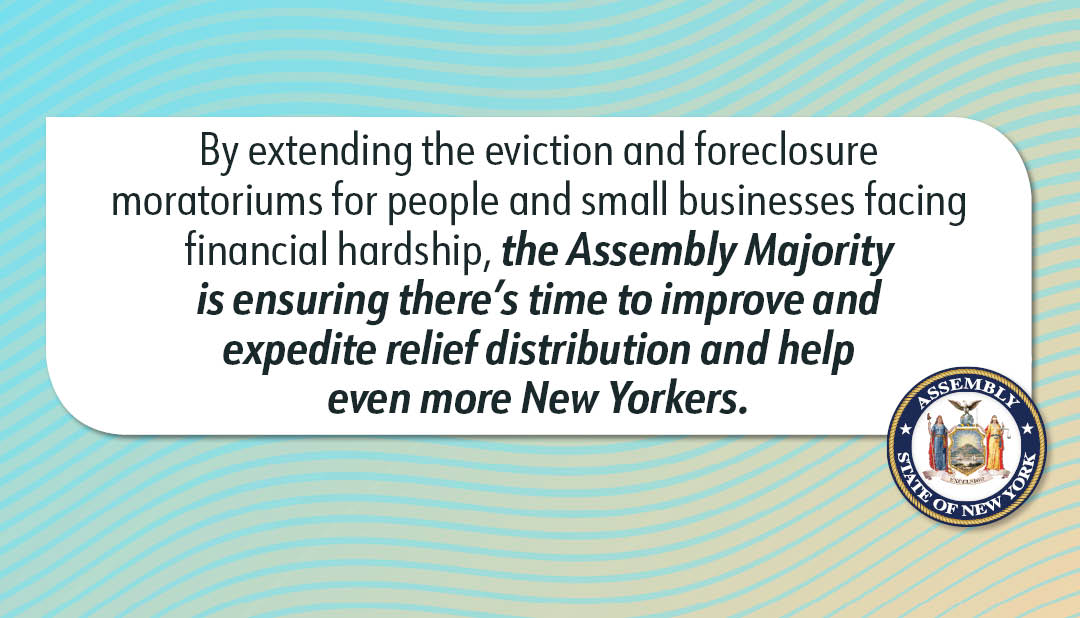 The issues surrounding the existing eviction and foreclosure moratorium and Emergency Rental Assistance Program (ERAP) are not at all simple and have led to a lot of confusion and unfortunately misinformation as well. Yesterday, the NYS Legislature passed legislation to address some of the outstanding issues and concerns, provided a mechanism for landlords to ensure that tenants who are not paying are actually suffering from financial hardship, and commits additional funding for legal representation for tenants in eviction proceedings.
The issues surrounding the existing eviction and foreclosure moratorium and Emergency Rental Assistance Program (ERAP) are not at all simple and have led to a lot of confusion and unfortunately misinformation as well. Yesterday, the NYS Legislature passed legislation to address some of the outstanding issues and concerns, provided a mechanism for landlords to ensure that tenants who are not paying are actually suffering from financial hardship, and commits additional funding for legal representation for tenants in eviction proceedings.
There are good and bad landlords just as there are good and bad tenants. The challenge has always been ensuring that those who are working in good faith receive the assistance they need while those who are trying to take advantage of a system that is in place to protect both tenants and small landlords do not unjustly benefit. During the course of the pandemic, I have spoken up and advocated for families who I represent that have been working through tremendous challenges including delayed unemployment benefits that they are still waiting for, lack of reliable childcare, and other hurdles that have prevented them from paying their rent. I have also met with and spoken up for small local landlords who have tenants who were creating nuisance conditions, not paying rent prior to and during the pandemic, and were not harmed by COVID as it relates to household income or COVID related expenses. In many circumstances, the landlords do not want to continue dealing with a difficult situation at their property and are enduring financial hardships attached to being required to keep the tenant. There are horror stories on both sides and there are justifiable concerns raised but ultimately these actions were necessary due to delays distributing funds to landlords from the ERAP program, a recent Supreme Court decision on the federal moratorium, and the surge of the highly contagious COVID-19 Delta variant. As a side note, I review the NYS DOH numbers daily on many metrics including positivity rates and the Capital Region, in spite of our high covid vaccination rate, continues to have the highest rate of positive infections in the state.
The legislation passed yesterday (A.40001, A.40002) that will be signed by the Governor, extends the eviction moratorium, suspension of mortgage and tax foreclosures, and small-business commercial eviction moratorium to Jan. 15, 2022, providing additional time to apply and receive funding disbursements from available assistance programs.
In addition, the legislation addresses the recent ruling by the United States Supreme Court on the eviction moratorium by giving landlords the ability to challenge hardship claims. In addition, New York is committing an additional $300 million in federal funding to ERAP, which provides rental arrears, temporary rental assistance, and utility arrears for low- and middle-income households and is paid directly to the landlords. This funding builds on the $2.3 billion in combined federal and state rental aid that was included in the state budget and will help even more families. We are adding an additional $150 million, for a total of $250 million, to a program that will assist small, struggling landlords with tenants who have simply refused to pay rent or even apply for the ERAP funds, or who were not eligible for the federal funding because they earn over 80% of the Area Median Income (AMI), or may no longer live in the rental unit but still owe back rent.
The COVID-19 pandemic continues and with schools starting, it is important to ensure the stability that families need as we continue to navigate the next steps and as the NYS Office of Temporary and Disability Assistance (OTDA) must continue to work on addressing the unacceptable delays in distributing ERAP funding. To me this is the main reason why I supported the moratorium extension. New Yorkers saw a major transition in the Executive this past month and Governor Hochul is quickly working to improve and streamline the existing relief programs.
We must continue to get the word out about the programs and resources that are available and ensure that factual information is out there regarding the rights and responsibilities of tenants and landlords.
It is important to remember that this bill also extends the small business commercial eviction moratorium, giving local small businesses relief while they are struggling to get back on their feet.
Corrective measures were included in this legislation to address the recent Supreme Court ruling by creating a mechanism for landlords to challenge a claim of financial hardship in court and will allow the court to verify whether an actual hardship exists. In addition, tenants can still be evicted for criminal or nuisance complaints and for the destruction of property during the moratorium, and clarification was included in this legislation to ease that process.
Additional details on the legislation
- This legislation extends several housing policies put in place to help New Yorkers stay in their homes during the pandemic through Jan. 15, 2022, including:
- The eviction moratorium for tenants filing a hardship declaration, which expired on Tuesday, Aug. 31
- The Tenant Safe Harbor Act allows tenants to claim a financial hardship defense in court during an existing eviction proceeding for non-payment or reduced rent payments
- The window for this law was originally for the declared disaster emergency, which was lifted on June 24, 2021
- The suspension of certain mortgage and tax foreclosures when the homeowner files a hardship declaration, which expired Aug. 31
- The small business commercial eviction moratorium for certain small businesses suffering a financial hardship, which expired Aug. 31
- Addresses the recent U.S. Supreme Court ruling which deemed the “self-attestation” standard for hardship unconstitutional as lacking sufficient due process protections for landlords.
- The bill would establish a mechanism for landlords to be heard in court to challenge a tenant’s hardship declaration.
- Provisions would be similarly amended to allow a mortgage lender or private tax lien holder to be heard in court on a foreclosure proceeding if they have a good-faith belief that the claimed hardship does not exist.
ERAP adjustment details
- The Emergency Rental Assistance Program (ERAP) is now a $2.6 billion program with an additional $300 million in federal funding due to New York State since it was disproportionately impacted by COVID-19
- Clarifies that tenants are protected from eviction for non-payment of arrears that could be covered by the program while their ERAP application is being reviewed, no matter when an eviction proceeding was brought against them
- Clarifies that ERAP eviction protections would still enable a property owner to seek an eviction where the tenant is persistently and unreasonably engaging in behavior that substantially infringes on the use and enjoyment of other tenants or causes a substantial safety hazard to others, or where the tenant intentionally causes substantial property damage
Additional clarifications and provisions
- Directs judges, when any eviction proceeding is filed, to advise tenants in court that financial assistance may be available through certain programs, even if they have been denied financial assistance in the past
- The judge would advise tenants and landlords to contact the local housing office serving that jurisdiction or the Office of Temporary and Disability Assistance (OTDA) for application information
- Authorizes OTDA to share limited application information about individual ERAP applicants with the Office of Court Administration (OCA)
- This information would improve the court’s ability to determine the appropriate ruling in an eviction proceeding
Supplemental Rental Assistance Program
- There is currently $100 million allocated to assist property owners whose tenants either are above the 80% area median income (AMI) threshold or have abandoned the residence or refused to pay rent, this legislation will increase by $150 million, totaling $250 million, and provides procedural guidelines and a timeline for the agency to launch the program.
- The program will start accepting applications from tenants earning 80-120% AMI and then subsequently landlords of vacated residences and landlords of those who refused to pay rent
Funding for legal representation for tenants – Civil Right to Counsel
A bill that I cosponsor that is sponsored by my colleague Assemblymember Latoya Joyner (A.7570) would create a civil right to counsel in eviction proceedings. Understanding the importance of legal representation for tenants since they will be required to go to court to prove their financial hardship, the legislation that was passed yesterday also provides $25 million to fund legal services for tenants unable to afford counsel facing eviction proceedings.
In closing, I supported this legislative action because in the long term, it is the right thing to do for all involved. With over 229,000 residents facing eviction, it does not make sense to start moving all of these cases into court as the system has only one speed. It is not a stretch to imagine eviction cases booked out to next June because of the sheer volume and it is wiser to try to manage the caseload by expediting the funding from OTDA to satisfy many of the potential evictions with landlords being paid. Still, we have protections in place to address the problems and allow eviction of those who have taken advantage of the process or who are a nuisance to others or causing damage to the property. As a reminder, even if funding is paid out through ERAP, the tenant still has a responsibility to pay the rent going forward, otherwise, they will face eviction.
Overall there are those who do not think this is fair and I get it. However, when one looks at the situation holistically, it is apparent that compromises have been made for the greater good of all.


Recent Comments